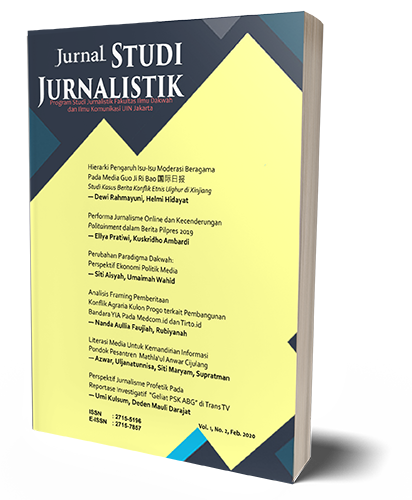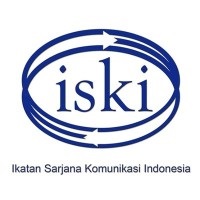Afiliasi Politik Media dalam Framing Pemberitaan Debat Pilpres 2024 pada Asumsi.co dan Republika.co.id
DOI:
https://doi.org/10.15408/jsj.v7i1.42859Keywords:
Afiliasi politik, framing, media massa, debat Pilpres, analisis framingAbstract
This study aims to analyze how the 2024 Presidential Election debate news is framed in two mass media, namely Assumption.co and Republika.co.id. Both media are known to have political affiliations. The CEO and Founder of Assumption.co, Pangeran Siahaan, was involved as the Spokesperson for the National Winning Team (TPN) for the Ganjar-Mahfud pair. Meanwhile, Republika.co.id is a media under the auspices of PT Mahaka Media Tbk, which was founded by Erick Thohir, Chief of the National Winning Team (TKN) Fanta, one of the elements of the Prabowo-Gibran TKN. Using Robert N. Entman's framing analysis method, this study examines four key elements of framing: defining problems, diagnosing causes, making moral judgments, and recommending treatments. In addition, this study also applies two major dimensions from Entman, namely issue selection and highlighting certain aspects. The study's results reveal differences in how the two media frame news related to the presidential and vice presidential candidate pairs. Asumsi.co consistently frames the 2024 presidential debate by focusing on the positive image of the Ganjar Pranowo-Mahfud MD pair, highlighting their mature performance and mastery of the material, while republika.co.id is more varied, highlighting aspects of personality, physical gestures, and rhetoric, with a primary focus on the positive image of Prabowo Subianto as a firm and experienced leader, as well as additional highlights on Gibran Rakabuming Raka, while being more critical of Anies Baswedan, especially regarding political ethics.
Keywords: Political affiliation, framing, mass media, presidential debate, framing analysis
References
Azwar, A., Putra, R. P., & Uljanatunnisa, U. (2021). Unsur Keberpihakan Pada Pemberitaan Media Online Analisis Wacana Kritis Pemberitaan Kampanye pada Kumparan.Com. Jurnal Studi Jurnalistik, 3(1), 48–62. https://doi.org/10.15408/jsj.v3i1.19878
Cushion, S., & Thomas, R. (2018). Reporting Elections: Rethinking the Logic of Campaign Coverage. Polity Press.
Dubois, E., & Blank, G. (2018). The echo chamber is overstated: the moderating effect of political interest and diverse media. Information Communication and Society, 21(5), 729–745. https://doi.org/10.1080/1369118X.2018.1428656
Eriyanto. (2021). Analsis Framing: Konstruksi Ideologi dan Politik Media. LKIS.
Hardani, A. (2020). Buku Metode Penelitian Kualitatif & Kuantitatif. Pustaka Ilmu Group.
Heryanto, G. G. (2018). Media Komunikasi Politik. IRCiSoD.
Kaid, L.. (2015). Handbook Penelitian Komunikasi Politik (M. Rizal, Ed.). Nusa Media.
Masduki, dkk. (2023). Kepemilikan dan Afiliasi Politik Media di Indonesia. PR2MEdia
McCoy, M.(2019). Scandal and Democracy: Media Politics in Indonesia. Cornell University Press. http://www.jstor.org/stable/10.7591/j.ctv8j54x
McNair, B. (2017). An Introduction to Political Communication (6th Edition). Routledge.
Pawito. (2009). Komunikasi Politik: Media Massa dan Kampanye Pemilihan. Citra Mandiri.
Sobur, A.. (2015). Analisis Teks Media: Suatu Pengantar Untuk Analisis Wacana, Analisis Semiotik, dan Analisis Framing. Bandung.
Strömbäck, J., & Esser, F. (2014). Introduction: Making sense of the mediatization of politics. Dalam Journalism Studies (Vol. 15, Nomor 3, hlm. 243–255). Routledge. https://doi.org/10.1080/1461670X.2014.897412
Tapsell, R. (2015). Indonesia’s Media Oligarchy and the “Jokowi Phenomenon.” Indonesia, 99, 29–50. https://doi.org/10.5728/indonesia.99.0029
Downloads
Published
Issue
Section
License
Copyright (c) 2025 Jurnal Studi Jurnalistik

This work is licensed under a Creative Commons Attribution-NonCommercial-ShareAlike 4.0 International License.















